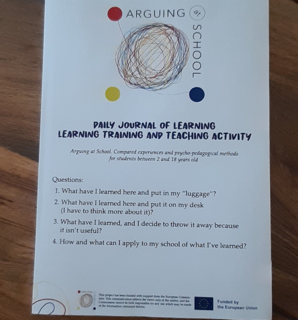by Elena Passerini – CPP
The Conflict Diary is a tool for teachers’ pedagogical work. It is an adult learning tool, offered in an adapted version to make the Arguing at School methods more transferable. It is an individual, free, and confidential writing activity to start a path of awareness Project reflection on one’s way of perceiving and experiencing conflicts. Writing concerns both one’s conflicts and those involving other people, starting with pupils at school. It is an important tool, used in the conflict competence training courses offered by the CPP to adults. It is extensively described in Daniele Novara’s book The Grammar of Conflict. In long-term courses, the focus is mainly on one’s conflicts, with different modes of reworking in small groups and plenary and different initial inputs, starting with the simplest and most direct one: “Write down a hot conflict you are currently involved in.”
The participants of the Litigare bene workshop in the context of the LTTA of the Arguing at School project started using it. However, the Diary has no connection to any particular pedagogical method but may help teachers to choose the method they need.
The Conflict Diary is a tool that uses the practice of writing to activate awareness and reflection on one’s way of being in conflict. The reactions that happen in tense situations are written down, so it is possible to read them. This tool makes it possible to read one’s own and others’ behaviors and to read it again after some time. It is used to work on adults’ conflict skills.
It is very useful for teachers in a school that is beginning to use a method for quarreling children or students. Some teachers may use only the Diary and let colleagues work on the method. The methods work especially where there is a clear educational cohesion among adults, allowing children or students to know what to do in case of quarreling. The tool has been used with the Litigare bene method, and the task to do it helped preschool and elementary school teachers to stop ineffective interventions into children’s quarrels.
Educational cohesion among adults must be built, it cannot be taken for granted.
The individual work on the Diary and subsequent reworking, done individually and/or in groups, always respecting confidentiality and individual sustainability, helps adults to focus on the issue of quarrels and accompanies the decision to introduce a new method for students. The teacher’s commitment to observing quarrels, to reading them rather than trying to interfere, is functional to the task of writing the Conflict Diary and greatly helps to enhance the teacher’s role as an observer, which is very important in the educational relationship, beyond the issue of quarrels.
Here are the proposed questions for completing the Conflict Diary with the individual and confidential work.
- How much do student quarrels weigh on you?
- Which quarrels weigh most heavily on you?
- Which quarrels weigh most heavily on you?
- I retrieve and write down a quarrel between my pupil(s)
- What happened?
- How did I feel?
- What did I do?
- Re-reading the episode written earlier, I ask myself:
- Was it conflict or was it violence?
- Was it an argument or was it an episode of violence, with a victim of intentionally harmful behavior?
- What phrases do adults say when a quarrel breaks out between children/students?
- I write examples of sentences told by me or told by people around me…
- I write examples of sentences told by me or told by people around me…
- What phrases were said to me when I was a child and there was a quarrel between children?
- Write down a hot conflict you are currently involved in
- What did I say/do?
- What did I try to say/do?
- What would I have liked?
What you will write in the Diary is and will remain confidential. This rule ensures adequate and functional introspective space for the self-training work you are going to do. You will use the Conflict Diary to keep track of at least three conflicts, a maximum of eight. These may be conflicts that you experience yourself over the next month, or conflicts of others that you witness. You will be able to keep track of them by writing as you wish.


